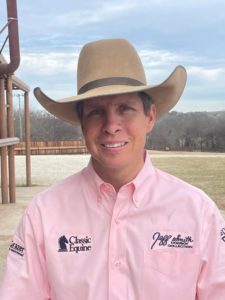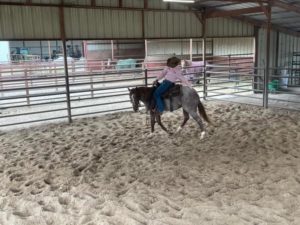
RCHTO Trainer Cayley Wilson
Your heart is thumping so loudly, your chest is about to burst, you’re barely breathing and you have a white-knuckled grip on the reins as you enter the herd…. Sound familiar? Nerves can get the best of us, even the pros on occasion. But the difference between the pros and everyone else: they have learned how to manage them. Nerves are not inherently bad. In fact, they can enhance your performance by making you more alert and give you more energy and excitement. The problem is when
they overwhelm you and start to impede your body and mind. Mental toughness is crucial in sports. Cow horse competition is no different. Mindset is everything.
RCHTO trainer Cayley Wilson struggled to get over bad runs and it was starting to affect his next rides. He knew he had to find a way to shake off his previous run.
Originally from Alberta, Canada, Wilson now runs his program out of Rosston, TX. At 10 years old he got his first horse and he tried reining, roping and competing in highschool rodeo. He took part in Randy Paul and Bob Avila clinics. As he gained experience, people started sending him problem rope horses. Les Timmons introduced Wilson to cow horses. He offered Wilson a horse to show and he won the Limited Open at the Alberta Reined Cow Horse Futurity. After that, he was hooked. As Wilson’s career grew, he got his horses show ready but realized he needed to prepare his own mind as well.
“I’d go and be focused to get the job done and something would happen in the show pen and the result wouldn’t be there that I was after. And rather than snapping out of it and going to the next horse, I would be defeated and it would wreck the next horse I had to show,” Wilson said.
His wife Katie suggested he meet with someone to help his mental fortitude. Wilson started seeing a sports psychologist and mental training consultant, Professor Roger Friesen, who has helped the Canadian Olympic Team. He worked on changing Wilson’s thought process and bad habits. It was a team effort. It took the accountability of Friesen, Wilson doing the mental exercises at home and Katie to remind him at shows to apply it, to change those habits.
“It’s in those [negative] moments that you have to train yourself,” Wilson said.
One of the most helpful analogies Friesen gave Wilson was to think of his thoughts as frequencies that can be changed like finding different radio stations.
“When you don’t like a song on the radio, you flip the station to a good one. He taught me when you’re showing a horse and something happens, you have to be able to forget about it.Whether it’s in your control or out of your control, you have about five minutes to think about it and try to learn from it and then leave it.”
You have to make a conscious effort to choose a new song (thought) and not bring the emotions or other baggage onto the next horse or maneuver.
“It’s not helping anybody by staying in the funk of disappointment. You have to drop it and move on.”

“By writing them down on this piece of paper, it showed me very clearly. I don’t know why it took writing it down, but it made me be very honest with how the horses were performing in each aspect.”
Wilson recalled one time at the Snaffle Bit Futurity he was riding a horse the owner paid a lot of money for and invested in training the horse. There was a lot of pressure to do well.
“In a guy’s mind you’ve put all of this time and effort into, and [the owners] dreams, into this horse. Now it’s all up to me in the moment to try to get this horse to come through so I can make the finals for [the owners].”
He said you can’t think about what is at stake. Instead he focuses on training. He said he is able to do his best when he knows the training is there.
“When I get to the show, I think of the different things I have to be able to do properly to get that horse shown. If the training is there and I have put the time in, I can be really confident in the job I’m doing. I can then almost have fun when I go in [to the arena],” Wilson said.
The same is true for amateurs: have confidence in your trainer’s work and be in the present moment.
He recommends visualizing the run and the feeling of getting a great score. Wilson will practice this even weeks before a show.
“I have this vision of the horse showing really good in this event. How it’s going to feel, how the arena looks. How it feels running, running to the stops, cutting a cow out of the herd and how it’s going to feel. How I’m going to drive out, cut clean, work it for a good amount of time, not get off it too early, make sure it’s a clean quit,” Wilson said, outlining the elements of a good run.
“If you approach it on a positive level, you’re going to win or make the finals. [Knowing] this is the product I’ve developed from my knowledge working this horse. You’ve got to approach it like this is going to be the next great horse…Show the judges what you brought there and be proud.”
Friesen also told Wilson to choose a trainer he thinks has a stop that he rates a 10, and one who has the best circle, etc. Then write down and rank each horse in his barn on every maneuver. This technique helped Wilson to focus on where the horse was weak. For example, Wilson said he rates Sarah Dawson’s circles a 10. Then he would grade that particular horse he was riding against that.
“Sometimes if the horse is really weak, at say, the turnarounds, I just know everyday for that animal I’ve got to work on the turnarounds.”
“By writing them down on this piece of paper, it showed me very clearly. I don’t know why it took writing it down, but it made me be very honest with how the horses were performing in each aspect.”
“What amazed me, even in a short period of time, you’ll be surprised how much better that horse gets in the weak area…It helped me focus and at the end of the day I would feel more on track.”
Wilson recommends updating the list once a week. The first time you write it down, it will take a while. When you go through it weekly, it gets faster.
It can be helpful to see the horse’s progress written down or see that horse with the 5 stop improved to a 6 stop. Seeing progress builds confidence in your program, which is especially important when you get to the show pen. Wilson doesn’t write it down anymore but he still keeps mental notes of the horse’s progress. He said the exercise was a major part of changing his mental habits.
Wilson said Friesen was instrumental in helping his career. He recommends getting someone outside of family and friends to more objectively look within and help you find ways to change those habits that don’t serve you, to elevate your whole game.
